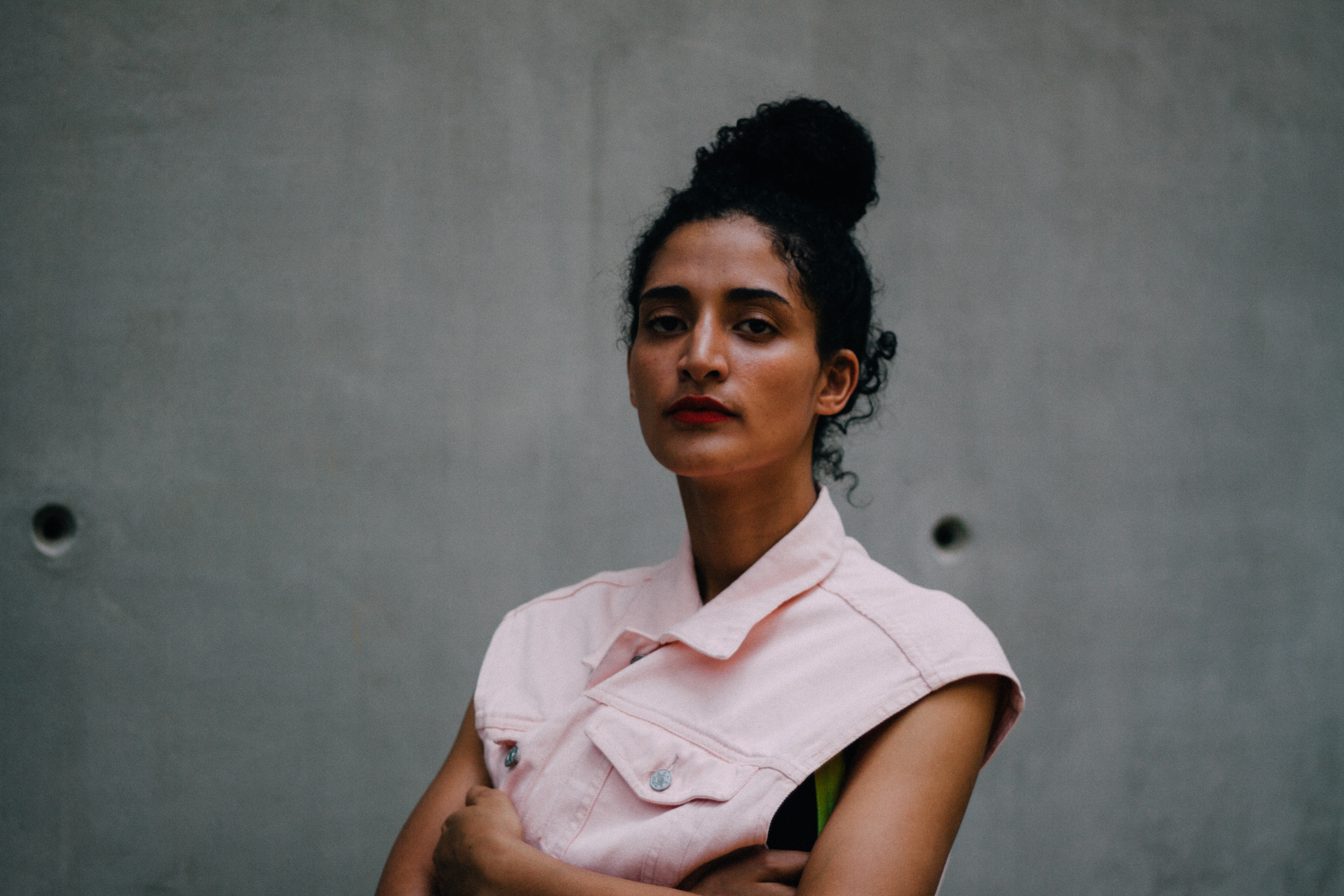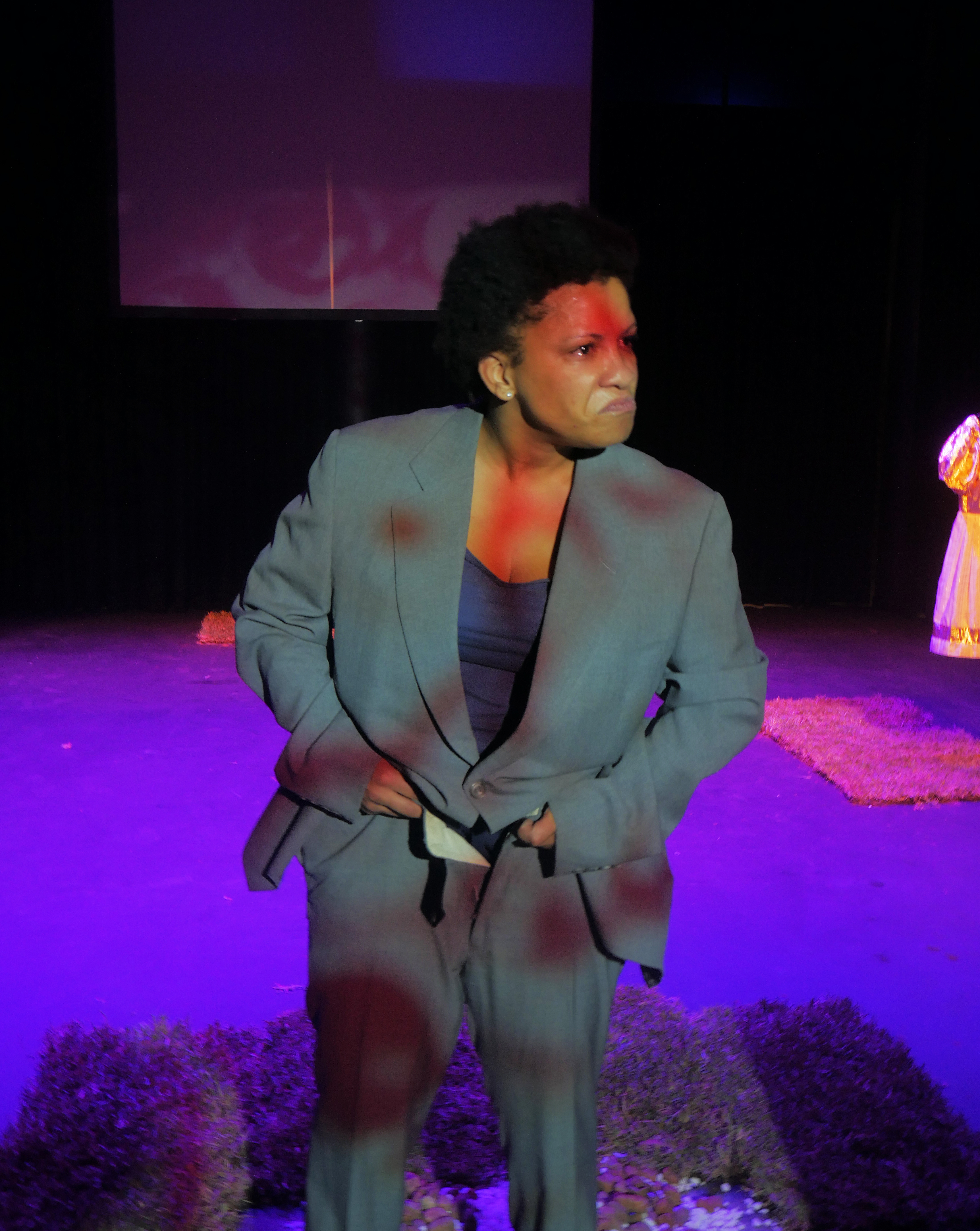Asia McDonald stars in the one woman play 'The Same Pain'. Photo: Supplied
There is an insistent physicality that drives Asia McDonald’s performance in The Same Pain. The one-woman play, which hurtles through various scenes for most of an hour, rides on McDonald’s tremendous talents as an actor and dancer. It is, however, a collaborative work bringing together several talents under the directorship of Carla Fonseca, including Nthato Mokgata’s abilities with sound texturing and Phumlani Pikoli’s graphic writing.

Carla Fonseca sits in the director’s chair for the one woman play The Same Pain. Photo: Supplied.
The Same Pain doesn’t follow a chronology as such, but is a definite search for catharsis by McDonald who flits through several characters over the course of the production.
The play begins with McDonald face down on the ground, her face melded to what looks like a mound of rocks, perhaps signifying the disempowerment of abuse. But the buzzing of flies (audible to the audience and depicted visually at various stages of their development) and other images that evoke rot and decomposition (visible through a projection positioned behind McDonald), suggest a depiction of something altogether more grim. Memory, vulnerability, trauma and the loss of innocence are also evoked throughout through the use of sound and imagery.

Throughout the play, Asia flits through several characters. Photo: Supplied
At some point, there is a chilling insert that reminds us how, typically, the burden of proof and healing is placed on the survivors of rape and sexual abuse as opposed to the perpetrators.
All these additional elements complement McDonald’s visceral and gutsy performance which stacks imagery more often than it relies on linear dialogue. As the title suggests, The Same Pain is an examination of the South African condition, specifically how the political and social conditions combine to produce an environment that is, quite literally, deadly for women.
“There was no script as such,” says McDonald, a few minutes after one of the play’s runs at the Soweto Theatre. “Carla got me to write about the hell I was in. I listened to people’s stories and we transcribed them.” Although McDonald is not specific as to the hell she survived, she does say that it largely kept her off the stage for over a decade. “The backbone of my hell was always the the pain I’ve dealt with my whole life, the pain your relatives go through but you can’t get to help them. There is so much of me in the story,” she says. “And so much of the experiences of people I’ve seen, directly and indirectly.”
As far as her approach to directing, Fonseca says the play, was, in a way, a response to how numbed she feels when she reads the country’s rape statistics. “I automatically know the direction I am going to go in because I always feel like it is my responsibility [to respond to social conditions]. But it was still a long process because I didn’t want to be selfish to Asia and say, ‘Bare your soul.’ But it did help me heal.”
McDonald says the process of putting the show together pushed her to another level in terms of understanding her own capabilities as a performer. “I don’t think I have done anything this hectic,” she says at the Soweto Theatre, wiping earth and tape residue off her mouth.
McDonald’s interest in acting and performance began in high school. After finishing high school in 2008, she studied dramatic arts at Wits University. She says participating in a staging of the Vagina Monologues in 2013 was among the performance gigs she participated in during her sabbatical but it did not represent the challenge she needed neither did it provide the levels of catharsis she was in search of.
Fonseca, also a believer in the healing powers of theatre, graduated with a bachelor’s degree in theatre and performance from the University of Cape Town in 2010. Her work focuses on South Africa’s historical and social traumas.
The Same Pain runs at the Soweto Theatre until February 10.